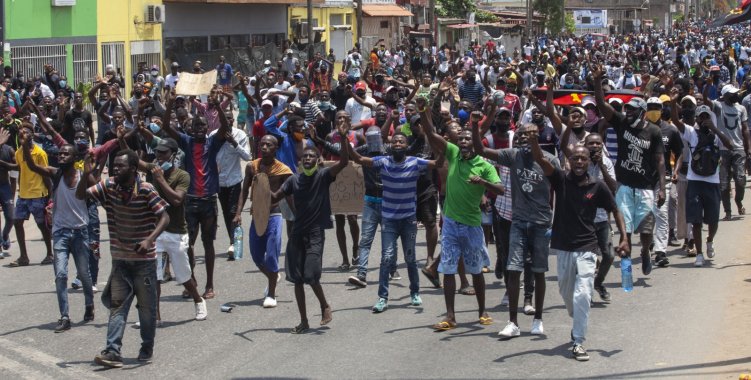Author of the book "A Revolução Angolana no Século XXI", which arrives in Portuguese bookstores on Thursday, Ruy Llera Blanes presents a study on democracy and its conditions in a post-independence Angola, in which the central axis is the emergency, in 2011, of the movement known in Angola as "Revú".
Speaking to the Lusa agency, the researcher considers that the way in which the Angolan regime approached the challenge of the "revús" exposes "the quality of democracy in a country, at least in a country like Angola, which defines itself as a social democracy".
"Seeing that level of violence, you realize that there is a problem here, a problem in terms of power, especially when it is a regime that calls itself democratic, that does not know how to deal with this difference", he adds.
The protest served the regime, then led by President José Eduardo dos Santos, to test its reaction to the mobilization of civil society, culminating in the so-called "15+2 Process", in which a group of activists were arrested and accused of an attempted of a coup d'état.
Asked whether the emergence of the "revús" arose in response to the lack of effectiveness in the political combat of the opposition parties, Llera Blanes responds that it reflects "a fairly large dissatisfaction with the actions of the parties and, in particular, the party in a situation of governance or power".
"I think it does reflect dissatisfaction with the way political participation is carried out in the country and also the result of the constitutional reforms that took place in 2010 and, as such, deep down, this movement was also, in a certain way, a attempt, a test to understand to what extent, or in what way, it is possible to have a politically active civil society in the country, with the consequences that we know", he adds.
With unemployment rates that frustrate the expectations of a mostly young population, the lack of equity in the distribution of wealth in a country that invested in hydrocarbon extraction and continues without diversifying its economy, the challenge of the "revús" "is almost a cry of despair", he argues.
"In the analyzes that are carried out, it is necessary to take into account that this movement is in a certain way transversal, that is, it brings together youth both, let's say, of some capacity or with some economic comfort, but it also brings together, and this is the most unprecedented, a youth that is quite marginalized from a social and economic point of view, that youth from the musseques. And in that sense it is, yes, it is a cry of despair", he details.
José Eduardo dos Santos succeeded João Lourenço, who opened the doors of the Presidential Palace to activists to hear their complaints.
"There really was an opening to civil society, relevant and unprecedented, especially in contrast to what had been happening in the last years of José Eduardo dos Santos. But it did not translate into effective changes", leading to it being considered an act.
"But then there is also the inability or lack of political will on the part of João Lourenço to change things, taking into account that he is the leader of a party with its own dynamics and which makes it difficult to make effective breaks with the past", advance.
Llera Blanes invokes "the power relations that exist within the party [MPLA] itself".
This translates somewhat into the idea that João Lourenço, "in order to cling to power, ends up having to make concessions to those who actually have political and economic power and, in this sense, the demands of the 'revús' end up being less relevant".
Llera Blanes explains that this book "is an interesting pretext to understand what the country's democratic health is. And to what extent the country, the regime, accepts or not a discourse about change or transformation".
"I used this concept a little in the book, also a little to play with what was the narrative of building the Angolan nation, very much guided around these concepts of socialist revolution", he highlights.
As for the "revús", Llera Blanes identifies very different paths: "those who defend a more radical transformation" and others who defend "more concrete lines of action and transformation".
Graduated in Anthropology, Ruy Llera Blanes is a researcher at CRIA – Centro em Rede de Investigação em Antropologia, at ISCTE‑IUL, and at the In2Past laboratory.
The "Revolução Angolana no Século XXI", published by Tinta da China, arrives in bookstores on Thursday and the formal launch will be made in Lisbon in the first week of December.







